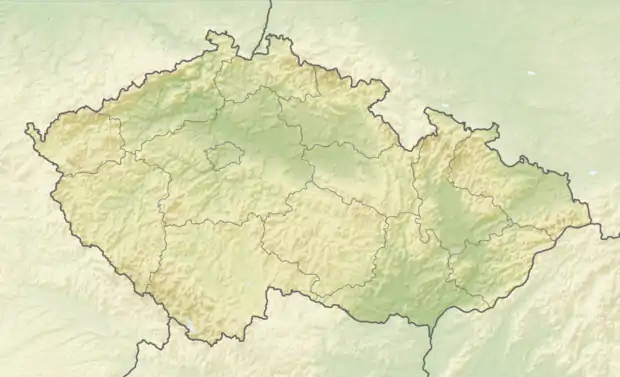Kašperské Hory
Kašperské Hory ([ˈkaʃpɛrskɛː ˈɦorɪ] (![]() listen); German: Bergreichenstein) is a town in Klatovy District in the Plzeň Region of the Czech Republic. It has about 1,400 inhabitants. It lies in the Bohemian Forest Range, some 65 km (40 mi) south of the region's capital of Plzeň. It is known as a ski resort. The town centre is well preserved and is protected by law as an urban monument zone.
listen); German: Bergreichenstein) is a town in Klatovy District in the Plzeň Region of the Czech Republic. It has about 1,400 inhabitants. It lies in the Bohemian Forest Range, some 65 km (40 mi) south of the region's capital of Plzeň. It is known as a ski resort. The town centre is well preserved and is protected by law as an urban monument zone.
Kašperské Hory | |
|---|---|
 Panorama of the town | |
 Coat of arms | |
 Kašperské Hory Location in the Czech Republic | |
| Coordinates: 49°8′38″N 13°33′34″E | |
| Country | |
| Region | Plzeň |
| District | Klatovy |
| First mentioned | 1337 |
| Government | |
| • Mayor | Bohuslava Bernardová |
| Area | |
| • Total | 44.13 km2 (17.04 sq mi) |
| Elevation | 758 m (2,487 ft) |
| Population (2021-01-01)[1] | |
| • Total | 1,404 |
| • Density | 32/km2 (82/sq mi) |
| Time zone | UTC+1 (CET) |
| • Summer (DST) | UTC+2 (CEST) |
| Postal code | 341 92 |
| Website | www |
Administrative parts
Villages of Červená, Dolní Dvorce, Kavrlík, Lídlovy Dvory, Opolenec, Podlesí, Tuškov and Žlíbek are administrative parts of Kašperské Hory.
History
Kašperské Hory existed already at the turn of the 13th and 14th centuries as an extensive mining settlement near an important gold-bearing area. The Kašperk Castle was built above the town by Charles IV to guard the border and protect the trade route and local gold mines. The castle was named after its founder Karlsberg ("Charles' Mountain" in German) and transcribed to Czech as Kašperk. In 1584 the town became a royal town.[2]
After World War I, with the dissolution of Austria-Hungary, the town became part of Czechoslovakia. According to the census of 1930, it had a population of 2,289, of which 2,103 (91.9%) were Germans and 186 (8.1%) were Czechs. After the end of the World War II in 1945, the original German-speaking population was forcibly expelled from the town and indeed all of Czechoslovakia according to the Potsdam agreement, with all of their property being confiscated. Subsequently, the town was repopulated with Czechs.
Tourism
The town's countryside provide five circular routes and two nature trails suitable both for walking and cycling. In winter there are tracks for cross-country skiing covering 20 km and a down hill skiing complex with artificial snow, three ski lifts and a ski school.
There are three museums in the town, the local history Museum of Šumava featuring extensive exhibitions on glass making, wood cutting, gold mining, natural history exhibits, folklore and seasonal exhibitions. The other museums are the Museum of Historical Motorcycles and Exposition on Czech Wooden Toys.
Notable people
- Johannes Cardinalis von Bergreichenstein (c.1375 – after 1428), lawyer and diplomat
- Kurt Raab (1941–1988), German actor
References
- "Population of Municipalities – 1 January 2021". Czech Statistical Office. 2021-04-30.
- "Historie města" (in Czech). Město Kašperské Hory. Retrieved 2021-06-10.
- "Partnerské město Grafenau" (in Czech). Město Kašperské Hory. Retrieved 2020-07-27.